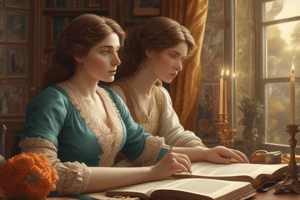Podcast
Questions and Answers
Which major literary genres are studied in the introduction to literature?
Which major literary genres are studied in the introduction to literature?
- Poetry, fiction, autobiography
- Prose, essays, folklore
- Drama, mythology, non-fiction
- Poetry, prose, drama (correct)
What key skill is emphasized in the writing proficiency component?
What key skill is emphasized in the writing proficiency component?
- Essay writing and argument development (correct)
- Poetic meter analysis
- Creative writing techniques
- Research seminar presentations
Which of the following is NOT a recommended extramural activity?
Which of the following is NOT a recommended extramural activity?
- Guest lectures
- Research conferences (correct)
- Literary societies
- Writing workshops
What aspect of critical theory is introduced in the curriculum?
What aspect of critical theory is introduced in the curriculum?
What is a recommended study tip for enhancing literary understanding?
What is a recommended study tip for enhancing literary understanding?
Flashcards
English Language and Linguistics
English Language and Linguistics
The study of how language is structured and used, including phonetics, syntax, and semantics.
Critical Theory
Critical Theory
Formalism, structuralism, and post-structuralism are examples of critical lenses used to analyze and interpret texts.
Essay Writing
Essay Writing
Writing essays that demonstrate critical thinking and argumentation, focusing on analyzing and interpreting literary texts.
Guest Lectures
Guest Lectures
Signup and view all the flashcards
Literary Societies
Literary Societies
Signup and view all the flashcards
Study Notes
Core Subjects
-
Introduction to Literature
- Focus on major literary genres: poetry, prose, drama.
- Study of historical and cultural contexts of texts.
-
English Language and Linguistics
- Basic concepts of phonetics, syntax, semantics, and morphology.
- Exploration of language variations and functions.
-
Critical Theory
- Introduction to key critical approaches: formalism, structuralism, post-structuralism.
- Understanding how to analyze texts through various theoretical lenses.
Key Skills Developed
-
Analytical Skills
- Developing the ability to interpret and critique literary texts.
-
Writing Proficiency
- Emphasis on essay writing and developing clear arguments.
-
Research Methods
- Basics of academic research, including finding and citing sources.
Recommended Reading
- Familiarization with canonical texts, including works by Shakespeare, Austen, and modern authors.
- Reading across different periods: Romantic, Victorian, Modernist.
Assessments
-
Essays
- Emphasis on critical analysis and argument formulation.
-
Exams
- Testing comprehension of literary concepts and texts.
Extracurricular Opportunities
-
Literary Societies
- Participation in discussions, writing workshops, and networking events.
-
Guest Lectures
- Attendance at events featuring authors and academics in the field.
Study Tips
-
Consistent Reading
- Engage with diverse texts to enhance understanding and appreciation of literature.
-
Group Discussions
- Collaborate with peers to enhance interpretation and critical thinking.
-
Utilize Office Hours
- Meet with professors for guidance and clarification on challenging topics.
Core Subjects
- Introduction to Literature focuses on major literary genres like poetry, prose, and drama.
- Students will learn about historical and cultural contexts of literary works.
- English Language and Linguistics covers key concepts including phonetics, syntax, semantics, and morphology.
- Students will explore how language varies and functions.
- Critical Theory introduces students to different critical approaches like formalism, structuralism, and post-structuralism.
- Students will learn how to analyze texts through various theoretical lenses.
Key Skills Developed
- Students develop analytical skills for interpreting and critiquing literary texts.
- Students develop writing proficiency through essays and argumentation.
- Students develop basic research methods, including finding and citing sources.
Recommended Reading
- Students should familiarize themselves with canonical texts, such as works by Shakespeare, Jane Austen, and modern authors.
- Students should diversify reading across periods from the Romantic Era, Victorian Era, and Modernist Era.
Assessments
- Students will be assessed through essays.
- Essays will emphasize critical analysis and argumentation.
- Students will be assessed through exams.
- Exams will test comprehension of literary concepts and texts.
Extracurricular Opportunities
- Students can join literary societies to participate in discussions, writing workshops, and networking events.
- Students can attend guest lectures featuring authors and academics in the field.
Study Tips
- Engage consistently with diverse texts to understand and appreciate literature.
- Participate in group discussions with peers to enhance interpretation and critical thinking.
- Utilize office hours with professors for guidance and clarification on challenging topics.
Studying That Suits You
Use AI to generate personalized quizzes and flashcards to suit your learning preferences.




